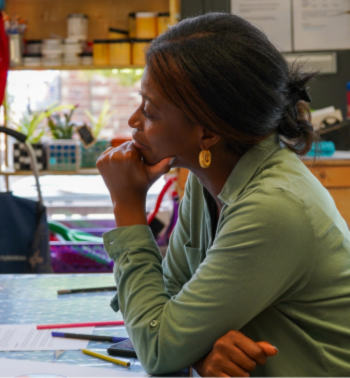20 May 2025
The PEACS (Pain: Equality of Care and Support in the Community) programme was developed to provide a bio-psycho-social, person-centred approach to chronic pain management - with a particular focus on Black communities in Lambeth, where the prevalence of chronic pain is significantly higher, especially amongst Black women.
Across two years - 1,547 people accessed the PEACS programme. As we conclude the programme, we share what we’ve learned.
About chronic pain
Chronic pain is defined as a persistent sensory and emotional experience that lasts for three months or more.
It affects 34% of people living within the UK and can often be debilitating leaving individuals feeling helpless and isolated. By 2040, experts predict that chronic pain will have the second largest increase of any health condition after diabetes. This is worrying, and even more worrying is that a large subsection of people living with chronic pain experience significant health inequalities relating to health outcomes and access.
Research conducted by the Health Survey for England showed that chronic pain disproportionately affected people from Black backgrounds (44%) compared to those of Asian (35%), Mixed and White backgrounds (34%), and more women (38%) than men (30%).
Addressing health inequalities
The PEACS programme began by looking at local prevalence data, which revealed that women from Black backgrounds are significantly more likely to be living with chronic pain in Lambeth. We are extremely grateful for the hard work of the late Prof Mark Ashworth who analysed primary care data across a four-year timeframe.
As a result, the PEACS team proactively connected with this population to provide a culturally-appropriate service which was co-developed and co-delivered with voluntary sector partners.
An average of 70% of participants were from Black backgrounds and Black women aged 45-64 were the most engaged group (37% of total participants).
The importance of patient-led care
PEACS was co-designed with individuals from the local community. This allowed for an approach that was rooted in the experiences of individuals and what was important to them.
Some of the cultural adaptations for the programme included modifying the intervention workshops to explore the impacts of themes like racial trauma and discrimination on health behaviours. The programme found space to actively discuss personal beliefs and cultural practices shape decisions and interactions with healthcare services.
Patients remained central to decision-making around their care throughout the programme.
Supporting the whole person
People with chronic pain have consistently told us that they carry the burden of coordinating their care across complex and disparate services.
They want to be seen as a whole person and supported to manage the impact of their condition on all aspects of their life, including an integrated approach to treating their mental and physical health and social support needs.
During the delivery of the project there was a strong focus on delivering individualised care to support participants to facilitate the adoption of healthier holistic lifestyle changes.
As a result of better self-management, individuals experienced a direct impact on their physical and mental health, as well as marked improvements in their communication skills and being able to articulate their needs with others. 79% of patients had gained new skills in self-management. 89% of people that participated in the programme found that they had gained new knowledge about chronic pain, and so were in a better position to manage autonomously. 59% reported stronger social connections with another 67% reporting reduced feelings of isolation. 65% of survey respondents felt more in control of their health.
Re-thinking traditional approaches
The co-design process with people from Black backgrounds identified current gaps in healthcare provision and the challenges experienced by individuals who often have complex needs. These cannot be addressed using a traditional one-size-fits-all approach. For example we added more time within workshops for discussion to help build a sense of community and increased provision into the evenings based on feedback.
In general, the evaluation found significant reductions in healthcare utilisation. There was a significant reduction in prescribed medications for 48% of participants and 58% of participants reduced the number of GP appointments. Two-thirds (64%) of people said the PEACS intervention compared favourably to other interactions with healthcare services.
What’s next?
The PEACS programme has delivered real, measurable impact - not only in improving outcomes for people with chronic pain, but also in demonstrating the power of co-design and culturally informed care. We’ve learned that involving the communities most affected leads to more relevant, engaging, and effective services.
We’ll be sharing this learning widely through the Mind & Body Improvement Network, including insights into how person-centered, holistic approaches can reduce health inequalities and improve self-management, confidence, and community connection.
Looking ahead, we’re working with Lambeth Together to scale PEACS across all nine PCNs in Lambeth, reaching more people with the support they need. In addition, we are applying for funding to establish three national pilot sites across England, adapting the model to local needs and proving its wider potential.
This is a project with clear evidence of success and enormous potential. If you'd like to learn more or explore how you can get involved, please contact mindandbody





